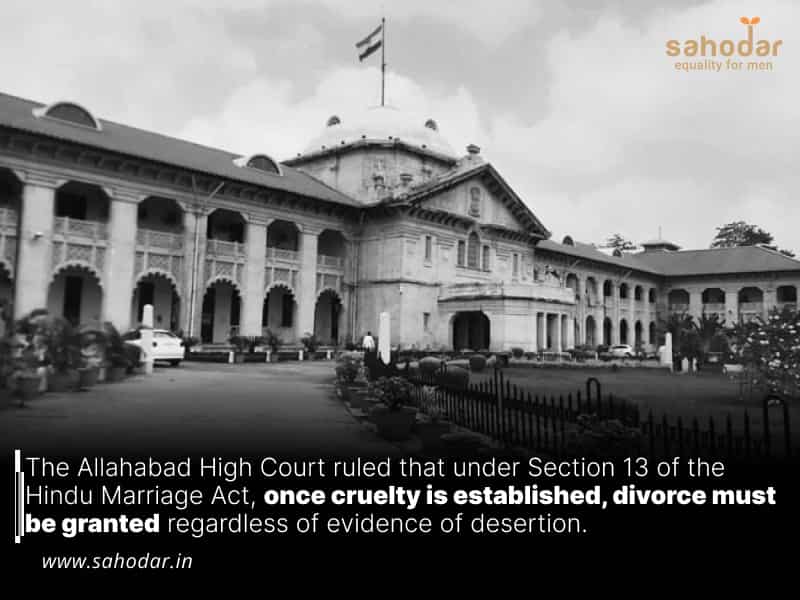The Allahabad High Court asserted that upon the Family Court’s determination of cruelty, the marriage should be dissolved. It emphasized that the absence of proof of desertion shouldn’t impede dissolution.
Furthermore, the Court clarified that the divorce grounds outlined in Section 13(1) of the Hindu Marriage Act are distinct and independent. It stressed that if any of these grounds are established, divorce must be granted, as the use of “or” between them renders them separate and non-dependent.
Section 13(1)(ia) of the Hindu Marriage Act, 1955 provides for divorce on grounds of cruelty. The state amendment of Uttar Pradesh to Section 13(1)(ia) provides for divorce when petitioner has been repeatedly or persistently been subjected to cruelty so as to “cause a reasonable apprehension in the mind of the petitioner that it will be harmful or injurious for the petitioner to live with the other party.”
“It has to be understood that each of these grounds are mutually exclusive to each other which is evident by use of the disjunctive ‘or’ to separate each ground from the other and there is no reason to read ‘or’ conjunctively as it will lead to absurdity. Thus, cruelty can by itself be a ground for dissolution of marriage. However, it seems that learned Family Court, after returning a finding that “cruelty” has been inflicted by the respondent-wife on the appellant-husband, refused to grant divorce to the husband presumably on the ground that the ground of “desertion” could not be proved by the appellant- husband.”
Factual Context
The couple wedded in 1986 and had two sons. The husband claimed that his wife’s behavior turned hostile after she became pregnant, involving mistreatment towards him and his parents. Since 2003, they communicated mainly through their sons or text messages despite living apart within the same household. Consequently, the husband filed for divorce under Section 13 of the Hindu Marriage Act, 1955.
Following the husband’s divorce filing, the wife initiated various legal actions under laws such as the Domestic Violence Act, Dowry Prohibition Act, Section 125 CrPC, and also filed a suit for restitution of conjugal rights under Section 9 of the Hindu Marriage Act.
In response to the allegations, the wife, in her written statement to the Family Court, refuted all accusations and claimed to be fulfilling her responsibilities towards her husband and children.
Both the divorce petition (under Section 13) and the suit for restitution of conjugal rights (under Section 9) were heard together by the Family Court. The Court denied the divorce but ordered the restoration of conjugal rights. Dissatisfied, the husband appealed to the High Court.
The husband’s counsel argued that since the Family Court acknowledged the wife’s cruelty, divorce should have been granted. He emphasized that the wife never contested the cruelty allegations and thus, forcing the husband to remain married was unjust.
Additionally, the husband’s counsel pointed out that they had been living separately since March 2012, with no attempts at reconciliation made by the wife, indicating an irreparable breakdown of the marriage.
In contrast, the wife’s counsel asserted that she had made sincere efforts to reconcile, and mere separation did not signify an irretrievable breakdown of the marriage.
High Court Ruling
The High Court noted that once cruelty was established by the Family Court, dismissing the divorce petition and ordering restitution of conjugal rights was inconsistent. It held that the absence of proof for desertion was irrelevant.
Stating that the conditions for granting divorce under Section 13 of the Hindu Marriage Act are distinct, the Court emphasized that divorce should have been granted upon establishing cruelty by the Family Court.
The Court found the Family Court’s decision to direct restitution of marriage despite acknowledging cruelty as contradictory. It deemed the cruelty finding sufficient to deny the decree of restitution under Section 9 of the Act.
Considering the couple’s long-term separation and failed attempts at reconciliation, the Court concluded that the marriage had irreparably broken down.
“There are bitter allegations of cruelty from both the sides and multiple litigations have taken place between the two in the last more than a decade. This embittered relationship between the appellant and respondent which has not witnessed any moment of peace for the last more than a decade or more is a martial relationship only on paper. The fact is that this relationship has broke down irretrievably long back.”
Consequently, the High Court ruled that the marriage between the parties was dissolved, with the option for the wife to pursue alimony through separate proceedings.

